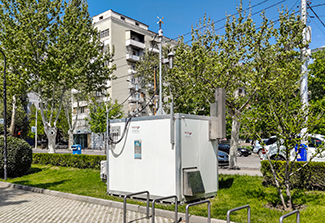This Fogarty trainee is learning to CARE for public & environmental health
May/June 2024 | Volume 23 Number 3
 Photo courtesy of A. Medvedkov/Adobe StockAir quality monitoring station in the Saburtalo district of Tbilisi, Georgia.
Photo courtesy of A. Medvedkov/Adobe StockAir quality monitoring station in the Saburtalo district of Tbilisi, Georgia.
"Public health is an opportunity to take care of an entire population, not just a small number of people," said Tamar Kashibadze, a public health specialist at the National Center for Disease Control and Public Health (NCDC) based in Tbilisi, Georgia. It is this expansive focus that attracted her to her profession. “Working in this field means that you are doing activities not exclusively for your country but for the world. You are a part of global change.”
Kashibadze is currently a doctoral trainee in the Fogarty-funded Clean Air Research & Education (CARE) program, which seeks to enlarge Georgia’s scientific capacity to conduct research related to noncommunicable diseases (NCDs) and environmental health. The program’s ultimate goal is to reduce NCDs through policy and practice. Tamar’s research project, focused on health impacts of ambient air pollution in Tbilisi, is one stepping stone toward achieving that aim.
Assessing air quality
Both air pollution and secondhand smoke have a great impact on the health of people in Georgia. According to WHO data, the country has the third highest mortality attributed to ambient and indoor air pollution in the world. Meanwhile, existing in-country research opportunities examining NCDs in relation to environmental health are limited in terms of both volume and range of topics. This lack of both scientific evidence on the subject and insufficient research openings in the area prompted Kashibadze to focus her work on air pollution and its impact on human health.
Several years ago, she participated in a workshop on air pollution and health organized by the WHO Regional Office for Europe. There, she was introduced to AirQ+, a software tool that can calculate the magnitude of air pollution's impact on health. The software is also able to estimate long- and short-term exposures to ambient pollution from several pollutants. “Georgia didn’t have any prior experience in conducting analyses using AirQ+ to determine the potential association between specific diseases and mortality rates linked to air pollution,” explained Kashibadze. “So this was precisely the focus I wanted to pursue.”
Insufficient national coverage of 24-hour air quality monitoring stations is one factor that led her to concentrate only on Tbilisi, Georgia’s capital city. Though she’s already conducted several analyses using AirQ+, her research is still in progress. Importantly, the CARE's data collection period covered the COVID-19 pandemic, so the team has also conducted a short-term exposure assessment to determine whether hospital admissions due to myocardial infarction were related to ambient air quality levels during the lockdown period from March to May 2020. “Preliminary results indicate an association between a reduction in major air pollutant levels and decreased hospital admissions,” she said.
 Photo courtesy of Tamar KashibadzeTamar Kashibadze, a doctoral student trainee, researches the impacts of ambient air pollution in Tbilisi, Georgia.
Photo courtesy of Tamar KashibadzeTamar Kashibadze, a doctoral student trainee, researches the impacts of ambient air pollution in Tbilisi, Georgia.
A global view
CARE is a collaboration between Emory University, NCDC, the Georgia National Environmental Agency, and Tbilisi State Medical University. The program has allowed Kashibadze to attend online classes at Emory and George Washington University, and she just returned from an intensive course in environmental health at Harvard. She appreciates these educational experiences in the U.S., which also include a previous 2015 Fogarty fellowship at State University of New York, Albany. “I expanded my skills in infectious disease epidemiology research, which I successfully use in the Georgian public health sector,” she said. Since 2017, she’s been in NCDC’s environmental health department, where she oversees, assesses, and manages public health and environmental health issues. Periodically, she also works as an independent expert on projects sponsored by the WHO, the Asian Development Bank, and the United Nations Development Program.
Meanwhile, the hard work of developing robust, evidence-based public health policies in Georgia is very much Kashibadze’s priority. The country achieved EU candidate status in December 2023 and “has already made significant progress in some respects,” she said. The introduction of universal health coverage has expanded access to essential health services, while vaccination programs have reduced the incidence of some preventable illnesses. Various prevention and management initiatives have begun to address the growing burden of NCDs, she said. These programs generally target individual risk factors, such as tobacco use, unhealthy diet, physical inactivity, and alcohol consumption, to prevent cardiovascular diseases, diabetes, and cancer. Looming universal dangers also occupy Kashibadze’s thoughts. "The environmental health system in Georgia is something that needs strengthening.”
Ultimately, Kashibadze’s CARE research that uses AirQ+ software will provide evidence that will help prevent premature deaths. The results will also allow for estimating potential health gains if policies and measures are put in place to reduce air pollution. “Environmental policies in Georgia are not always a top funding priority given the scarcity of public resources and various competing social needs,” she said. “I’m sure this work will contribute to evidence-based decision making regarding national funding priorities.”
More Information
Updated June 21, 2024
To view Adobe PDF files,
download current, free accessible plug-ins from Adobe's website.
Related Fogarty Programs
Related World Regions / Countries